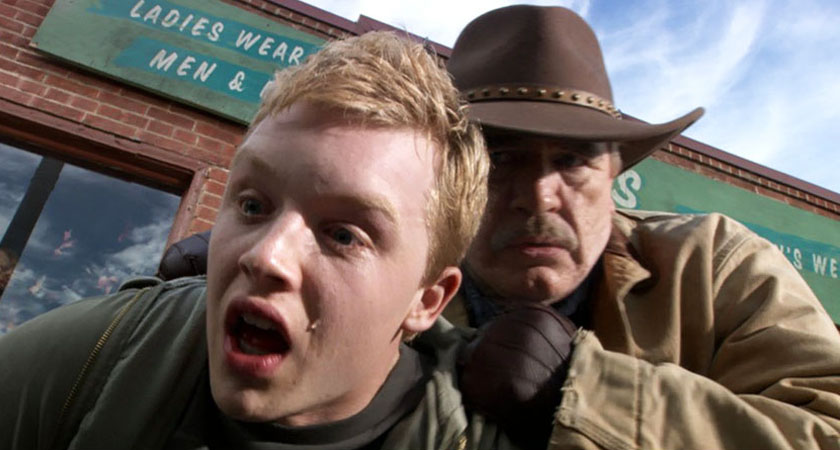By Chlotrudis Independent Film Society
Rating: 4 cats
Director: Lucky McKee | Trygve Allister Diesen
Starring: Brian Cox | Kyle Gallner | Noel Fisher | Tom Sizemore

Country: united_states
Year: 2008
Running time: 98
IMDB: http://www.imdb.com/title/tt0972883/
Jason says: “One of the few things I miss about living in the suburbs versus the city is that it’s difficult for me to keep a dog. My family had them while I was growing up, and I envy my brothers with their dachshunds and labs. Pets do become a part of one’s family, and that simple fact is what makes RED compelling; most of us can sympathize with a man defending their family, even when it comes down to wanting justice for the four-legged members.
“Red is an old dog belonging to Avery Ludlow (Brian Cox), the mostly-retired owner of the local general store. One morning, he and Red are out fishing when three teenagers come upon him, carrying a gun and looking for money. Avery doesn’t have much on him, which displeases the boys; the ringleader, Danny McCormack (Noel Fisher) takes his anger out on Red, shooting the old dog dead. When Avery gets back to town, he’s looking for justice, but his attorney friend Sam (Richard Riehle) has bad news – according to the law, Red was merely property, with destruction of property being a misdemeanor, and Danny’s father Michael (Tom Sizemore) is one of the wealthiest and most powerful men in town. Avery is undeterred, so Sam decides to bring in Carrie Donnel (Kim Dickens), a reporter for a nearby TV station, in the hopes that shaming the McCormacks will lead to Danny admitting his responsibility. Instead, things begin to escalate.
“That the audience will get more angry at a dog’s death than a person’s is a cliché in movies, of course, to the point where even the rebelling against it has become tiresome – the audiences applauding a dog’s killing in a horror movie is by now a merely (ironically?) Pavlovian reaction, rather than delighted shock that a filmmaker is willing to do something others shy from. It’s a cliché that comes from a real place, though, and this movie earns its use: It shows us Red as Avery’s constant companion, and peppers the rest of the film with other dog lovers, casually or forcefully reminding the audience of the bond a person and his dog share whenever the audience might think Avery should just let it go.
“Part of what makes the movie refreshing is that for most of the movie, Avery doesn’t go off the rails, or do so in a grandiose manner. This could easily have become a violent revenge movie, about Avery finding new and vicious ways to eliminate his dog’s killers; instead, he’s mainly looking for an apology and acknowledgment that what they did was wrong. There’s a bit more going on than that, of course; we learn things about Avery’s life that give him a keener than usual interest in the kids’ attitudes, and we see how not having someone in one’s life to love and be loved by in return, even a dog, can throw a person off.
“We never really feel that Avery is too far off, though, because Brian Cox is great in the part. Cox is best known for playing menacing authority figures in supporting roles, and bits of that creep into Avery; there are moments, such as when he opens his own gun cabinet or starts methodically figuring out how to go about tracking down his attackers, that it becomes very clear that this old man is not a good enemy to make. He’s a good man, and probably a good friend, but somewhat removed from the rest of us.
“It’s Cox’s movie, to be sure, but it’s also peppered with other favorite character actors: Richard Riehle is there, for instance, playing Sam as a loyal small-town lawyer, without the scuzziness his characters often have. There’s Tom Sizemore as the father who is too successful a bully to visibly throw his weight around, and Kyle Gallner as his younger, guilt-ridden son. Robert Englund and Amanda Plulmmer are note-perfect as the hostile parents of the less-prosperous third boy. Kim Dickens is a nice presence as the reporter who, though a cat person herself, finds herself caught up in Avery’s battle.
“Putting such a good cast in what appears to be a very low-budget independent film is going to stretch resources thin, and the most obvious evidence of that happening is when the ‘directed by’ credit comes up with both Lucky McKee and Danish director Trygve Allister Diesen. McKee was the first attached but appears to have left the project midway through; apparently money ran out and when new financing was found, Diesen finished the film (much of the post-production crew is also Danish). There are times when the fractured production history is fairly obvious – one climactic scene is awkwardly staged so that presumably unavailable cast members only appear in silhouette – but for the most part things work well enough. It’s a slow, satisfying burn, with a good eye for small-town America at both its best and worst.
“Indeed, it winds up working very well for something that wound up being cobbled together to a certain extent. I can’t guess how faithful it is to Jack Ketchum’s novel, or McKee’s original plans, but Brian Cox does a fine job holding this low-key drama together. Four dogs
” Seen 15 July 2008 at Concordia Theatre Hall (Fantasia Festival)”
